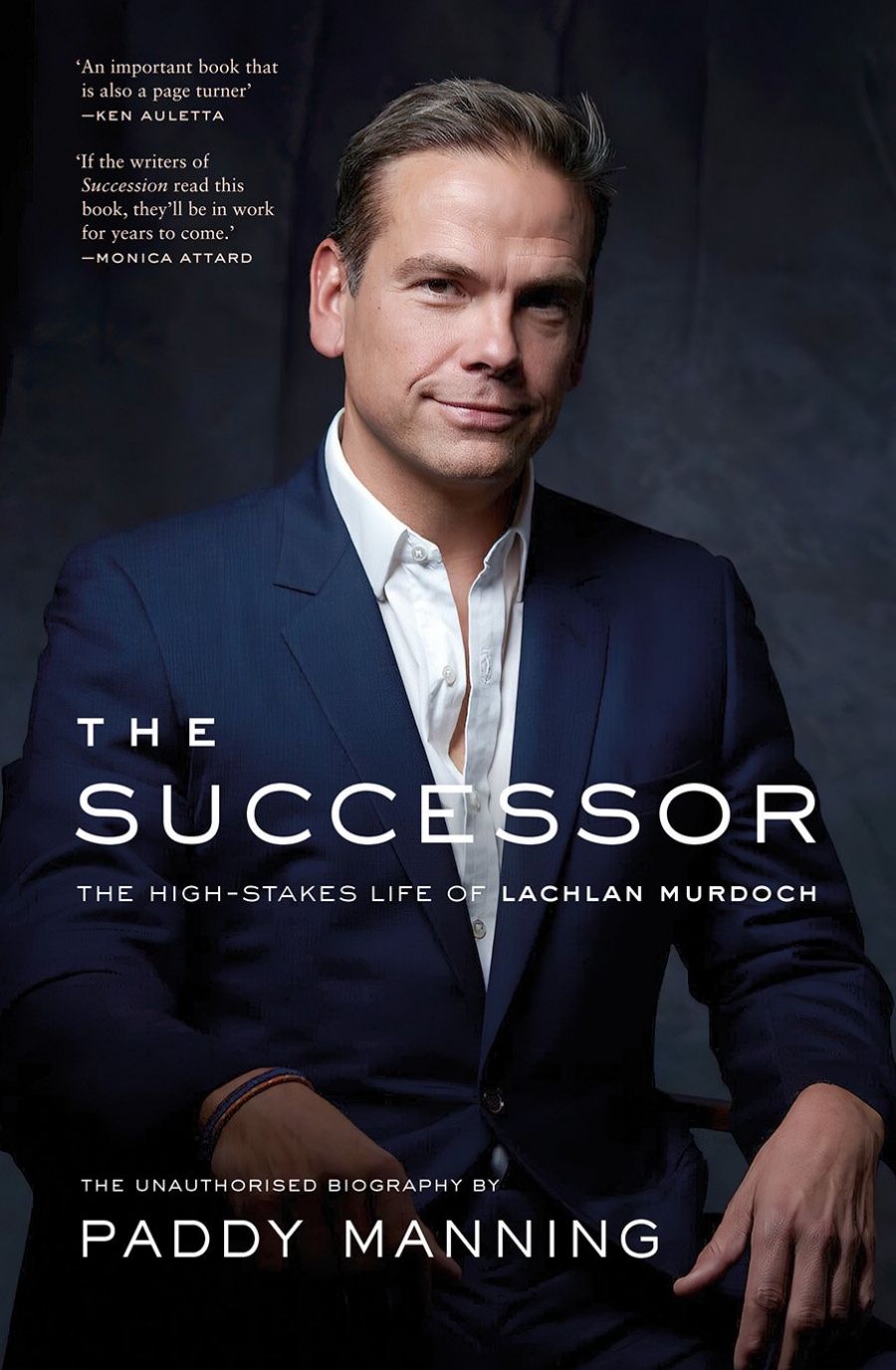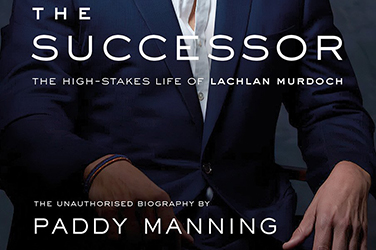
- Free Article: No
- Contents Category: Biography
- Review Article: Yes
- Article Title: Dual focus
- Article Subtitle: The life of Lachlan Murdoch
- Online Only: No
- Custom Highlight Text:
In the 1990s, seeing a ‘hot-red weapon’ of a motorbike being ridden into the News Corp car park in Sydney, journalist Paddy Manning could not help but ask, ‘What’s that?’ Still wearing his helmet, the rider answered that the bike was an MV Agusta – at which point Manning realised he had yelled at Lachlan Murdoch.
- Featured Image (400px * 250px):

- Alt Tag (Featured Image): Patrick Mullins reviews 'The Successor: The high-stakes life of Lachlan Murdoch' by Paddy Manning
- Book 1 Title: The Successor
- Book 1 Subtitle: The high-stakes life of Lachlan Murdoch
- Book 1 Biblio: Black Inc., $34.99 pb, 346 pp
The life Manning lays out is a neat Bildungsroman. Surrounded by the Murdoch family mythos from a young age, Lachlan was willingly pressed into the family business. After studying philosophy at Princeton, he was dispatched to entry-level jobs – at the printing presses for Sydney’s Daily Mirror, as a junior reporter for the San Antonio Express – before being appointed general manager of Queensland Press Ltd when he was twenty-two. Skipping up the corporate ladder over the next six years, Murdoch worked to grow the Courier-Mail, led the efforts of the breakaway Super League, reinvigorated The Australian, and more besides. The effect was threefold. His penchant for journalism was tempered by the exigencies of financial returns; he made a deep, ingrained connection with a particular idea of Australia; and he gained the credentials he felt were necessary to be his father’s eventual successor.
Yet for others those credentials were always in question. Lachlan’s relocation to the United States in 2000 was followed by the unravelling of One.Tel, the fad telecommunications provider into which News Corp had poured $575 million, partly at Lachlan’s urging; the arising proceedings were then paralleled, in the United States, by disdain and brusque treatment from both News Corp executives and his own father. Lachlan’s decision to walk away from the company, in 2005, and to return to the country he terms home – Australia – was catalysed by Rupert’s withering dismissal to Roger Ailes, head of Fox News: ‘Don’t listen to Lachlan.’
In a narrative that he almost certainly had a hand in promulgating, Lachlan proved himself his own man through his Australian-based private investment company, Ilyria. His choices were not all winners – some, in fact, were outright disasters – but the results were plain. He invested shrewdly in FM radio and took a successful stake in the Indian Premier League through the Rajasthan Royals. He did not invest in The Bulletin, even though its history appealed to him. He became a billionaire in his own right. Retrospectively, too, his decision to exit News Corp became one of his best. It left him untarnished by the opprobrium that arose from the discovery of the rampant phone hacking taking place at the News Corp-owned British tabloid, News of the World.
Then, in 2013, with Elisabeth Murdoch one year dead, his father divorcing Wendi Deng, brother James Murdoch’s reputation in the mire, and the cloud of scandal only seeming to grow around the company, Lachlan accepted his father’s plea to return to the family business. It was a decision made, it seems, from pity: ‘Lachlan knew that his father had been through the wringer […] Lachlan felt he could not refuse, at a time when his father seemed vulnerable.’ Nearly a decade later, Lachlan is the uncontested and publicly anointed heir to the media empire his father has spent so many years building.
These were not easy years. Lachlan had cleaned up sexual harassment scandals at Fox, dealt with Donald Trump, and been deeply involved in the sale to Disney of a range of Fox assets, including 20th Century Fox and stakes in Sky, Star, and Hulu. The increasingly secure financial position that the Disney deal brought about, however, has been accompanied by questions about Murdoch’s complicity in, and approval of, Fox’s increasingly toxic broadcasts. As academics Yochai Benkler, Robert Faris, and Hal Roberts have argued, Fox News has accredited and amplified the excesses of radical, right-wing news sites in American discourse and become a propaganda outlet affecting only the trappings of professional journalism.
In these detailed later chapters especially, Manning exposes an apparent contradiction. There is the handsome, pleasant, soft-left, ‘touchy-feely’ liberal of Lachlan Murdoch’s youth, established in the book’s first third; then there is the Lachlan Murdoch of the latter two-thirds, who talks of free speech in henhouse sentences, pals around with Tony Abbott and the IPA, presides over Tucker Carlson programs on the racist ‘great replacement theory’, and cuts away from the congressional hearings that have exposed Donald Trump’s role in the storming of the US Capitol. What happened? Did Lachlan Murdoch change?
The evidence mustered by Manning suggests not. Murdoch has long been vigorously conservative, and it seems that he has seen in Fox’s current position a synthesis of ideology and profitability. But if the slightest sense of unknowing remains – as if Murdoch were still wearing that motorcycle helmet – there is none at all about the nature of the company his father built and which he now leads. Pursuit of profit, tribal affiliation, disregard for high ethical standards, the determination to dominate: all these characterise Fox Corporation and News Corp just as well as speed, noise, and red paint do for an MV Agusta. Time will reveal whether any difference between vehicle and rider, company and owner, is important enough to remark upon.


Comments powered by CComment